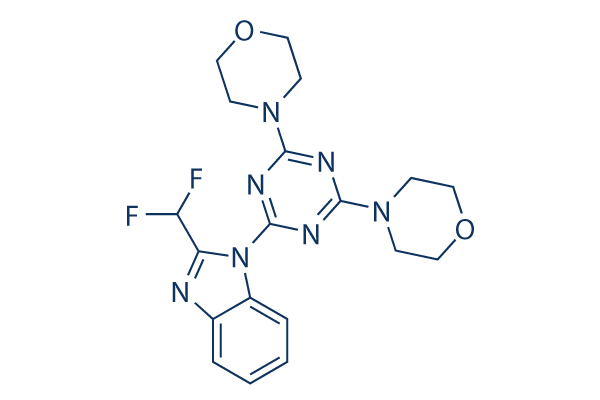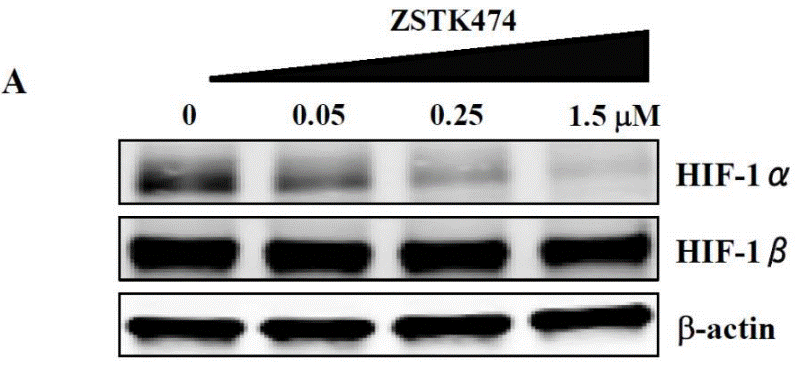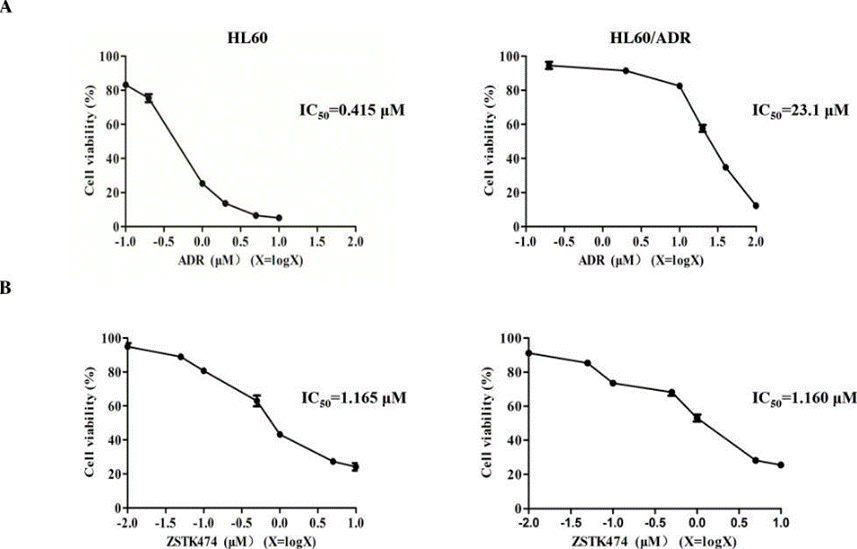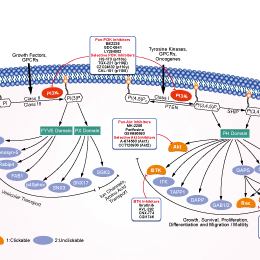
- Bioactive Compounds
- By Signaling Pathways
- PI3K/Akt/mTOR
- Epigenetics
- Methylation
- Immunology & Inflammation
- Protein Tyrosine Kinase
- Angiogenesis
- Apoptosis
- Autophagy
- ER stress & UPR
- JAK/STAT
- MAPK
- Cytoskeletal Signaling
- Cell Cycle
- TGF-beta/Smad
- DNA Damage/DNA Repair
- Compound Libraries
- Popular Compound Libraries
- Customize Library
- Clinical and FDA-approved Related
- Bioactive Compound Libraries
- Inhibitor Related
- Natural Product Related
- Metabolism Related
- Cell Death Related
- By Signaling Pathway
- By Disease
- Anti-infection and Antiviral Related
- Neuronal and Immunology Related
- Fragment and Covalent Related
- FDA-approved Drug Library
- FDA-approved & Passed Phase I Drug Library
- Preclinical/Clinical Compound Library
- Bioactive Compound Library-I
- Bioactive Compound Library-Ⅱ
- Kinase Inhibitor Library
- Express-Pick Library
- Natural Product Library
- Human Endogenous Metabolite Compound Library
- Alkaloid Compound LibraryNew
- Angiogenesis Related compound Library
- Anti-Aging Compound Library
- Anti-alzheimer Disease Compound Library
- Antibiotics compound Library
- Anti-cancer Compound Library
- Anti-cancer Compound Library-Ⅱ
- Anti-cancer Metabolism Compound Library
- Anti-Cardiovascular Disease Compound Library
- Anti-diabetic Compound Library
- Anti-infection Compound Library
- Antioxidant Compound Library
- Anti-parasitic Compound Library
- Antiviral Compound Library
- Apoptosis Compound Library
- Autophagy Compound Library
- Calcium Channel Blocker LibraryNew
- Cambridge Cancer Compound Library
- Carbohydrate Metabolism Compound LibraryNew
- Cell Cycle compound library
- CNS-Penetrant Compound Library
- Covalent Inhibitor Library
- Cytokine Inhibitor LibraryNew
- Cytoskeletal Signaling Pathway Compound Library
- DNA Damage/DNA Repair compound Library
- Drug-like Compound Library
- Endoplasmic Reticulum Stress Compound Library
- Epigenetics Compound Library
- Exosome Secretion Related Compound LibraryNew
- FDA-approved Anticancer Drug LibraryNew
- Ferroptosis Compound Library
- Flavonoid Compound Library
- Fragment Library
- Glutamine Metabolism Compound Library
- Glycolysis Compound Library
- GPCR Compound Library
- Gut Microbial Metabolite Library
- HIF-1 Signaling Pathway Compound Library
- Highly Selective Inhibitor Library
- Histone modification compound library
- HTS Library for Drug Discovery
- Human Hormone Related Compound LibraryNew
- Human Transcription Factor Compound LibraryNew
- Immunology/Inflammation Compound Library
- Inhibitor Library
- Ion Channel Ligand Library
- JAK/STAT compound library
- Lipid Metabolism Compound LibraryNew
- Macrocyclic Compound Library
- MAPK Inhibitor Library
- Medicine Food Homology Compound Library
- Metabolism Compound Library
- Methylation Compound Library
- Mouse Metabolite Compound LibraryNew
- Natural Organic Compound Library
- Neuronal Signaling Compound Library
- NF-κB Signaling Compound Library
- Nucleoside Analogue Library
- Obesity Compound Library
- Oxidative Stress Compound LibraryNew
- Plant Extract Library
- Phenotypic Screening Library
- PI3K/Akt Inhibitor Library
- Protease Inhibitor Library
- Protein-protein Interaction Inhibitor Library
- Pyroptosis Compound Library
- Small Molecule Immuno-Oncology Compound Library
- Mitochondria-Targeted Compound LibraryNew
- Stem Cell Differentiation Compound LibraryNew
- Stem Cell Signaling Compound Library
- Natural Phenol Compound LibraryNew
- Natural Terpenoid Compound LibraryNew
- TGF-beta/Smad compound library
- Traditional Chinese Medicine Library
- Tyrosine Kinase Inhibitor Library
- Ubiquitination Compound Library
-
Cherry Picking
You can personalize your library with chemicals from within Selleck's inventory. Build the right library for your research endeavors by choosing from compounds in all of our available libraries.
Please contact us at [email protected] to customize your library.
You could select:
- Antibodies
- Bioreagents
- qPCR
- 2x SYBR Green qPCR Master Mix
- 2x SYBR Green qPCR Master Mix(Low ROX)
- 2x SYBR Green qPCR Master Mix(High ROX)
- Protein Assay
- Protein A/G Magnetic Beads for IP
- Anti-Flag magnetic beads
- Anti-Flag Affinity Gel
- Anti-Myc magnetic beads
- Anti-HA magnetic beads
- Magnetic Separator
- Poly DYKDDDDK Tag Peptide lyophilized powder
- Protease Inhibitor Cocktail
- Protease Inhibitor Cocktail (EDTA-Free, 100X in DMSO)
- Phosphatase Inhibitor Cocktail (2 Tubes, 100X)
- Cell Biology
- Cell Counting Kit-8 (CCK-8)
- Animal Experiment
- Mouse Direct PCR Kit (For Genotyping)
- New Products
- Contact Us
ZSTK474
ZSTK474 inhibits class I PI3K isoforms with IC50 of 37 nM in a cell-free assay, mostly PI3Kδ. Phase1/2.

ZSTK474 Chemical Structure
CAS No. 475110-96-4
Purity & Quality Control
Batch:
Purity:
99.98%
99.98
ZSTK474 Related Products
Signaling Pathway
Cell Data
| Cell Lines | Assay Type | Concentration | Incubation Time | Formulation | Activity Description | PMID |
|---|---|---|---|---|---|---|
| Sf21 insect cells | Function assay | 1 h | Inhibition of bovine recombinant PI3K p110delta expressed in Sf21 insect cells using phosphatidylinositol as substrate after 1 hr by phosphoimaging, IC50=0.7 nM | 21882832 | ||
| human HCT116 cells | Function assay | 15 mins | Inhibition of PIK3CA H1047R mutant-mediated cell signaling in human HCT116 cells expressing PTEN assessed as inhibition of insulin-induced pAkt/PKB phosphorylation at Thr308 treated for 15 mins before insulin challenge measured after 5 mins by immunoblotting, IC50=78 nM | 21882832 | ||
| human LNCAP cells | Proliferation assay | 3 days | Antiproliferative activity against human LNCAP cells after 3 days by MTS assay, IC50=0.21 μM | 20227881 | ||
| human NZB5 cells | Proliferation assay | 5 days | Antiproliferative activity against human NZB5 cells expressing wild type p110alpha assessed as incorporation of [3H]thymidine after 5 days, IC50=0.22 μM | 21882832 | ||
| human NZOV9 cells | Proliferation assay | 5 days | Antiproliferative activity against human NZOV9 cells expressing p110alpha kinase Y1021C mutant assessed as incorporation of [3H]thymidine after 5 days, IC50=0.29 μM | 21882832 | ||
| human MDA-MB-468 cells | Cytotoxic assay | 48 h | Cytotoxicity against PTEN-deficient human MDA-MB-468 cells assessed as inhibition of cell growth after 48 hrs by Cell Titer 96 assay | 23795239 | ||
| human A549 cells | Function assay | 10 μM | 1 h | Inhibition of PI3K in human A549 cells assessed as reduction in pAkt level at 10 uM after 1 hr by Western blotting analysis | 25766633 | |
| human DMS114 cells | Growth inhibition assay | Growth inhibition of human DMS114 cells | 22336246 | |||
| human MKN74 cells | Growth inhibition assay | Growth inhibition of human MKN74 cells | 22336246 | |||
| human SNB78 cells | Growth inhibition assay | Growth inhibition of human SNB78 cells | 22336246 | |||
| human St-4 cells | Growth inhibition assay | Growth inhibition of human St-4 cells | 22336246 | |||
| human DU145 cells | Growth inhibition assay | Growth inhibition of human DU145 cells | 22336246 | |||
| human LOXIMVI cells | Growth inhibition assay | Growth inhibition of human LOXIMVI cells | 22336246 | |||
| human PC3 cells | Growth inhibition assay | Growth inhibition of human PC3 cells | 22336246 | |||
| human LOXIMVI cells | Growth inhibition assay | Growth inhibition of human LOXIMVI cells | 22336246 | |||
| human OVCAR3 cells | Growth inhibition assay | Growth inhibition of human OVCAR3 cells | 22336246 | |||
| human SKOV3 cells | Growth inhibition assay | Growth inhibition of human SKOV3 cells | 22336246 | |||
| human KM12 cells | Growth inhibition assay | Growth inhibition of human KM12 cells | 22336246 | |||
| human HT-29 cells | Growth inhibition assay | Growth inhibition of human HT-29 cells | 22336246 | |||
| human HCT15 cells | Growth inhibition assay | Growth inhibition of human HCT15 cells | 22336246 | |||
| human NCI-H226 cells | Growth inhibition assay | Growth inhibition of human NCI-H226 cells | 22336246 | |||
| human NCI-H522 cells | Growth inhibition assay | Growth inhibition of human NCI-H522 cells | 22336246 | |||
| human A549 cells | Growth inhibition assay | Growth inhibition of human A549 cells | 22336246 | |||
| human HCC2998 cells | Growth inhibition assay | Growth inhibition of human HCC2998 cells | 22336246 | |||
| human SNB75 cells | Growth inhibition assay | Growth inhibition of human SNB75 cells | 22336246 | |||
| human OVCAR4 cells | Growth inhibition assay | Growth inhibition of human OVCAR4 cells | 22336246 | |||
| human OVCAR5 cells | Growth inhibition assay | Growth inhibition of human OVCAR5 cells | 22336246 | |||
| human OVCAR8 cells | Growth inhibition assay | Growth inhibition of human OVCAR8 cells | 22336246 | |||
| human SKOV3 cells | Growth inhibition assay | Growth inhibition of human SKOV3 cells | 22336246 | |||
| human ACHN cells | Growth inhibition assay | Growth inhibition of human ACHN cells | 22336246 | |||
| Click to View More Cell Line Experimental Data | ||||||
Biological Activity
| Description | ZSTK474 inhibits class I PI3K isoforms with IC50 of 37 nM in a cell-free assay, mostly PI3Kδ. Phase1/2. | ||||||||||
|---|---|---|---|---|---|---|---|---|---|---|---|
| Features | First orally administered PI3K inhibitor used in vivo. | ||||||||||
| Targets |
|
| In vitro | ||||
| In vitro | ZSTK474 at 1 μM potently reduces PI3K activity to 4.7% of the control level, whereas LY2194002 only reduces the activity to 44.6% of the control. ZSTK474 inhibits the activities of recombinant p110β, -γ, and -δ with IC50 of 17 nM, 53 nM, and 6 nM, respectively. ZSTK474 shows potent antiproliferative activity against a panel of 39 human cancer cell lines with mean GI50 of 0.32 μM, more effectively than that of LY294002 or wortmannin with mean GI50 of 7.4 μM or 10 μM, respectively. ZSTK474 treatment at 1 μM blocks membrane ruffling and generation of PIP3 induced by platelet-derived growth factor in murine embryonic fibroblasts (MEFs). ZSTK474 at 10 μM induces apoptosis in OVCAR3 cells, and induces complete G1-phase arrest but not apoptosis in A549 cells. ZSTK474 treatment at 0.5 μM significantly decreases the level of phosphorylated Akt and GSK-3β, as well as the cyclin D1 protein expression. ZSTK474 also inhibits the phosphorylation of other downstream signaling components that are involved in regulating cell proliferation including FKHRL1, FKHR, TSC-2, mTOR, and p70S6K in a dose-dependent manner. [1] ZSTK474 does not inhibit mTOR at 0.1 μM, and even at a concentration of 100 μM, ZSTK474 inhibits mTOR activity less than 40%. [2] ZSTK474 blocks VEGF-induced cell migration and the tube formation in human umbilical vein endothelial cells (HUVECs), and inhibits the expression of HIF-1α and secretion of VEGF in RXF-631L cells, exhibiting potent in vitro antiangiogenic activity. [3] ZSTK474 treatment inhibits the production of IFNγ and IL-17 in concanavalin A-activated T cells, and inhibits the proliferation and PGE(2) production by fibroblast-like synovial cells (FLS). [6] |
|||
|---|---|---|---|---|
| Kinase Assay | Inhibition of PI3K activity | |||
| A549 cells are lysed in a buffer containing 20 mM Tris-HCl (pH 7.5), 150 mM NaCl, 5 mM EDTA, and 1% Igepal CA-630, the lysates are centrifuged at 20,000 g and 4 °C for 10 minutes, and the supernatants are used as cell lysate (protein = 2-4 mg/mL). To immunoprecipitate PI3K, 200 μL of cell lysate are incubated with anti-p85 polyclonal antibody and protein G-agarose (5 μL). PI3Kα, PI3Kβ, and PI3Kδ can be immunoprecipitated by the anti-p85 polyclonal antibody. Agarose beads containing immunoprecipitates are washed twice with buffer A (20 mM Tris-HCl at pH 7.5, 150 mM NaCl, 5 mM EDTA, and 1% Igepal CA-630), once with buffer B (500 mM LiCl and 100 mM Tris-HCl at pH 7.5), once with distilled water, and once with buffer C (100 mM NaCl and 20 mM Tris-HCl at pH 7.5). Immunoprecipitates are suspended in 20 μL of buffer C containing phosphatidylinositol of 200 μg/mL. The mixture is preincubated with increasing concentrations of ZSTK474 at 25 °C for 5 minutes. [γ-32P]ATP (2 μCi per assay mixture; final concentration, 20 μM) and MgCl2 (final concentration, 20 mM) are added to start the reaction. The reaction mixture is incubated at 25 °C for 20 minutes. Phosphorylated products of phosphatidylinositol are separated by thin-layer chromatography and visualized by autoradiography. The phosphatidylinositol-3-phosphate region is scraped from the plate, and radioactivity is also measured with liquid scintillation spectroscopy. The level of inhibition for ZSTK474 is determined as the percentage of 32P counts per minute obtained without ZSTK474. | ||||
| Cell Research | Cell lines | MCF-7, HT-29, HCT-116, OVCAR3, A549, et al. | ||
| Concentrations | Dissolved in DMSO, final concentrations ~10 μM | |||
| Incubation Time | 48 hours | |||
| Method | Cells are exposed to increasing concentrations of ZSTK474 for 48 hours. The inhibition of cell proliferation is assessed by measuring changes in total cellular protein by use of a sulforhodamine B assay. Apoptosis is assessed by chromatin condensation or by flow cytometry. For chromatin condensation assay, cells are stained with Hoechst 33342 and examined by fluorescence microscopy. Morphologic changes induced by ZSTK474, such as the condensation of chromatin, are indicative of apoptosis. For flow cytometry analysis, cells are harvested, washed with ice-cold PBS, and fixed in 70% ethanol. Cells are then washed twice with ice-cold PBS again, treated with RNase A (500 μg/mL) at 37 °C for 1 hour, and stained with propidium iodide (25 μg/mL). The DNA content of the cells is analyzed with a flow cytometer. |
|||
| Experimental Result Images | Methods | Biomarkers | Images | PMID |
| Western blot | HIF-1α / HIF-1β p-Rb / p27 / Cyclin D1 P-gp / MRP1 p-PDK1 / p-GSK3β / p-AKT / AKT |

|
23812078 | |
| Growth inhibition assay | Cell viability |

|
28388564 | |
| In Vivo | ||
| In vivo | Oral administration of ZSTK474 inhibits the growth of subcutaneously implanted mouse B16F10 melanoma tumors in a dose-dependent manner, producing tumor regression of 28.5%, 7.1%, or 4.9% on day 14 at 100, 200, or 400 mg/kg, respectively, which is superior to that of the four major anticancer drugs at their respective maximum tolerable doses with tumor regression of 96%, 35.7%, 24%, or 68.3%, respectively. ZSTK474 treatment at 400 mg/kg completely inhibits the growth of A549, PC-3, and WiDr xenografts in mice, and induces the regression of A549 xenograft tumors. [1] ZSTK474 significantly inhibits tumor growth in the RXF-631L xenograft model, correlated with a significantly reduced number of microvessels in the ZSTK474-treated mice. [3] Oral administration of ZSTK474 ameliorates the progression of adjuvant-induced arthritis (AIA) in rats. [6] |
|
|---|---|---|
| Animal Research | Animal Models | Male BDF1 mice injected subcutaneously with B16F10 cells, and female BALB/c nude mice inoculated subcutaneously with A549, PC-3, or WiDr cells |
| Dosages | ~400 mg/kg/day | |
| Administration | Orally | |
Chemical Information & Solubility
| Molecular Weight | 417.41 | Formula | C19H21F2N7O2 |
| CAS No. | 475110-96-4 | SDF | Download ZSTK474 SDF |
| Smiles | C1COCCN1C2=NC(=NC(=N2)N3C4=CC=CC=C4N=C3C(F)F)N5CCOCC5 | ||
| Storage (From the date of receipt) | |||
|
In vitro |
DMSO : 15 mg/mL ( (35.93 mM) Moisture-absorbing DMSO reduces solubility. Please use fresh DMSO.) Water : Insoluble Ethanol : Insoluble |
Molecular Weight Calculator |
|
In vivo Add solvents to the product individually and in order. |
In vivo Formulation Calculator |
||||
Preparing Stock Solutions
Molarity Calculator
In vivo Formulation Calculator (Clear solution)
Step 1: Enter information below (Recommended: An additional animal making an allowance for loss during the experiment)
mg/kg
g
μL
Step 2: Enter the in vivo formulation (This is only the calculator, not formulation. Please contact us first if there is no in vivo formulation at the solubility Section.)
% DMSO
%
% Tween 80
% ddH2O
%DMSO
%
Calculation results:
Working concentration: mg/ml;
Method for preparing DMSO master liquid: mg drug pre-dissolved in μL DMSO ( Master liquid concentration mg/mL, Please contact us first if the concentration exceeds the DMSO solubility of the batch of drug. )
Method for preparing in vivo formulation: Take μL DMSO master liquid, next addμL PEG300, mix and clarify, next addμL Tween 80, mix and clarify, next add μL ddH2O, mix and clarify.
Method for preparing in vivo formulation: Take μL DMSO master liquid, next add μL Corn oil, mix and clarify.
Note: 1. Please make sure the liquid is clear before adding the next solvent.
2. Be sure to add the solvent(s) in order. You must ensure that the solution obtained, in the previous addition, is a clear solution before proceeding to add the next solvent. Physical methods such
as vortex, ultrasound or hot water bath can be used to aid dissolving.
Tech Support
Answers to questions you may have can be found in the inhibitor handling instructions. Topics include how to prepare stock solutions, how to store inhibitors, and issues that need special attention for cell-based assays and animal experiments.
Tel: +1-832-582-8158 Ext:3
If you have any other enquiries, please leave a message.
* Indicates a Required Field
Tags: buy ZSTK474 | ZSTK474 supplier | purchase ZSTK474 | ZSTK474 cost | ZSTK474 manufacturer | order ZSTK474 | ZSTK474 distributor







































